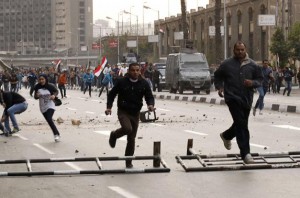Many people were killed at pro-democracy protests in Egypt, the anniversary of the 2011 uprising that toppled autocrat Hosni Mubarak, security sources said.
In the bloodiest day of protests since Abdel Fattah al-Sisi was elected president in June, security forces and plain clothes police fired at protestors, witnesses said.
The anniversary is a test of whether Islamists and liberal activists have the resolve to challenge a government that has stamped out dissent since then-army chief Sisi ousted elected Islamist president Mohamed Morsi in July 2013 after mass protests against his rule.
Dozens of protesters were killed during last year’s anniversary. Again this year, security forces fanned out across the capital and other cities.
The heaviest death tool was in the Cairo suburb of Matariya, a Muslim Brotherhood stronghold. Special forces fired pistols and rifles at protesters, a Reuters witness said. Eight people, including one policeman, were killed, according to the health ministry.
People in Matariya chanted “down with military rule” and “a revolution all over again”. Demonstrators threw Molotov cocktails at security forces and fires raged
Riot police backed by soldiers in armored vehicles sealed off roads, including those leading to Cairo’s Tahrir Square, the symbolic heart of the 2011 revolt.
In downtown Cairo, riot police with rifles and plain clothed men with pistols chased protesters through the streets.
Six people were killed in separate protests in Alexandria, Egypt’s second biggest city, Giza governorate outside of Cairo and the Nile Delta province of Baheira, security sources said.
A bomb wounded two policemen stationed outside a Cairo sports club, the sources said.
Signs of discontent built up as the anniversary of the revolt against Mubarak approached, and a liberal woman activist, Shaimaa Sabbagh, was killed at a protest on Saturday.
About 1,000 people marched in her funeral procession on Sunday. The Health Ministry said she had been shot in the face and back and Interior Ministry spokesman Hany Abdel Latif said an investigation into her death had begun, adding: “No one is above the law.”
“Shaima was killed in cold blood,” Medhat al-Zahid, vice president of the Socialist Popular Alliance party that Sabbagh belonged to, told a news conference.

